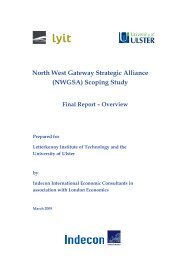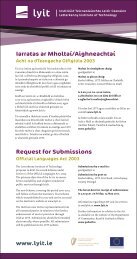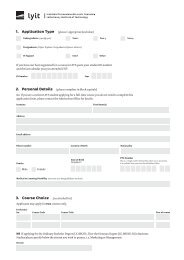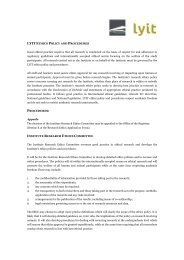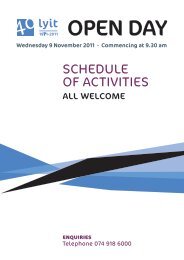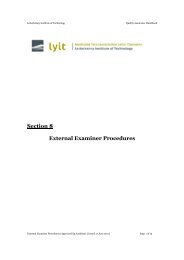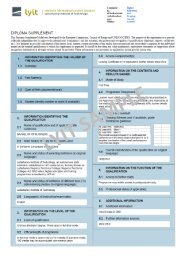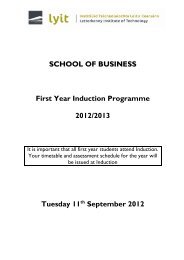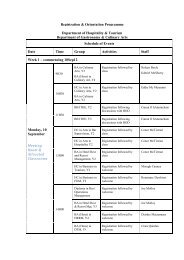Electronic & Mechanical Engineering - Letterkenny Institute of ...
Electronic & Mechanical Engineering - Letterkenny Institute of ...
Electronic & Mechanical Engineering - Letterkenny Institute of ...
You also want an ePaper? Increase the reach of your titles
YUMPU automatically turns print PDFs into web optimized ePapers that Google loves.
<strong>Electronic</strong> <strong>Engineering</strong><br />
course title<br />
Bachelor <strong>of</strong> <strong>Engineering</strong> in<br />
<strong>Electronic</strong> <strong>Engineering</strong><br />
national framework level<br />
7<br />
cao code<br />
ly607<br />
duration<br />
3 years<br />
number <strong>of</strong> places<br />
40<br />
awarding body<br />
lyit<br />
points in recent years<br />
year final median<br />
2009/10 105 235<br />
2010/11 aqa 240<br />
2011/12 145 230<br />
Is this the course for you<br />
We all use electrical devices and systems<br />
everyday and behind the operation<br />
<strong>of</strong> each one is an electronic engineer<br />
– from household items such as stereos,<br />
microwaves, televisions, radios, power<br />
tools and digital cameras to more<br />
complicated devices such as satellites,<br />
security systems, mobile phones and<br />
mp3 players. Do you wonder how these<br />
devices work Are you interested in<br />
making them have better sound, a<br />
clearer picture, more power, or a<br />
new feature<br />
<strong>Electronic</strong> engineering looks at how<br />
electricity is used to control equipment<br />
and create these different products<br />
and systems. It overlaps a little<br />
with computer engineering in the<br />
area <strong>of</strong> computer programming but<br />
concentrates more on the electrical<br />
parts that make up a product, the<br />
circuit design and the operation <strong>of</strong><br />
signal technology.<br />
Minimum entry requirements<br />
Pass (od3 or better) in 5 Leaving<br />
Certificate subjects, including passes<br />
in Mathematics and in either Irish or<br />
English (or an equivalent qualification).<br />
The minimum points for entry is<br />
140 points.<br />
Career opportunities<br />
As a technician/technologist in<br />
electronic engineering, you will have<br />
great career opportunities at home and<br />
abroad in design, manufacturing<br />
and maintenance <strong>of</strong> electronic systems<br />
and devices.<br />
1 Develop systems for audio visual<br />
entertainment and information systems<br />
and the light electronic equipment<br />
sector including Play Stations, digital<br />
cameras and microwaves<br />
1 Design worldwide networks for phone,<br />
radio or television<br />
1 Build and test telecommunications<br />
systems including wireless devices,<br />
navigation systems and radar<br />
1 Work on the design <strong>of</strong> new satellites to<br />
provide instant access to voice, image or<br />
other data anywhere in the world<br />
1 Use robotics to design automatic<br />
controls for machines, appliances<br />
or s<strong>of</strong>tware<br />
1 Help design medical equipment such as<br />
pacemakers and hearing aids.<br />
Employers include:<br />
1 Telecommunications companies<br />
1 Central and local Government<br />
1 Radio and television broadcasters<br />
1 <strong>Electronic</strong> parts manufacturers<br />
1 Electrical utilities<br />
1 Research and educational centres.<br />
Visit www.steps.ie, www.ieee.org and<br />
www.asee.org for more career ideas.<br />
Follow-on courses<br />
1 B.Eng Honours in Embedded Systems<br />
at LYIT<br />
1 Honours and Masters Degrees at<br />
other universities.<br />
124



